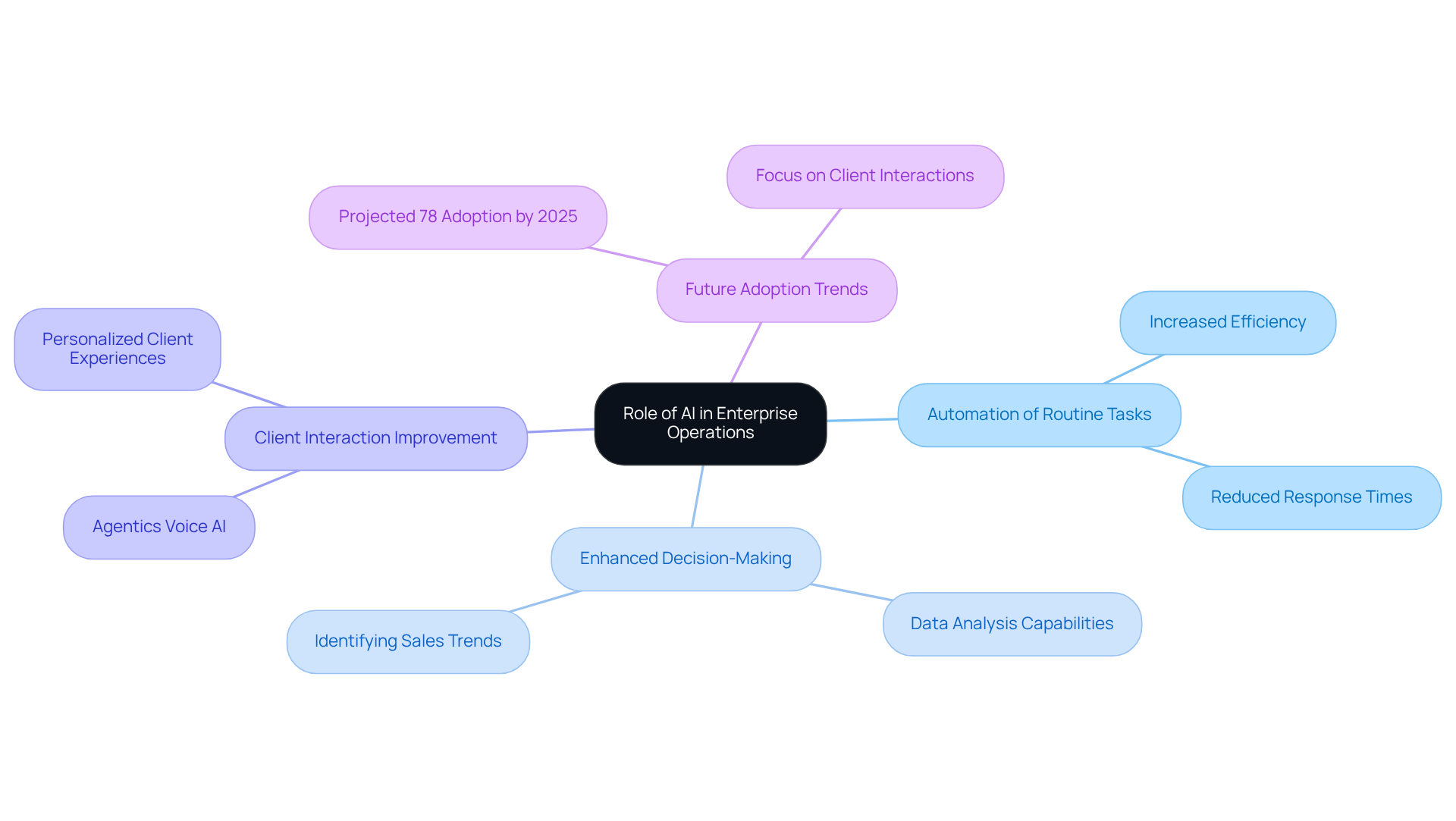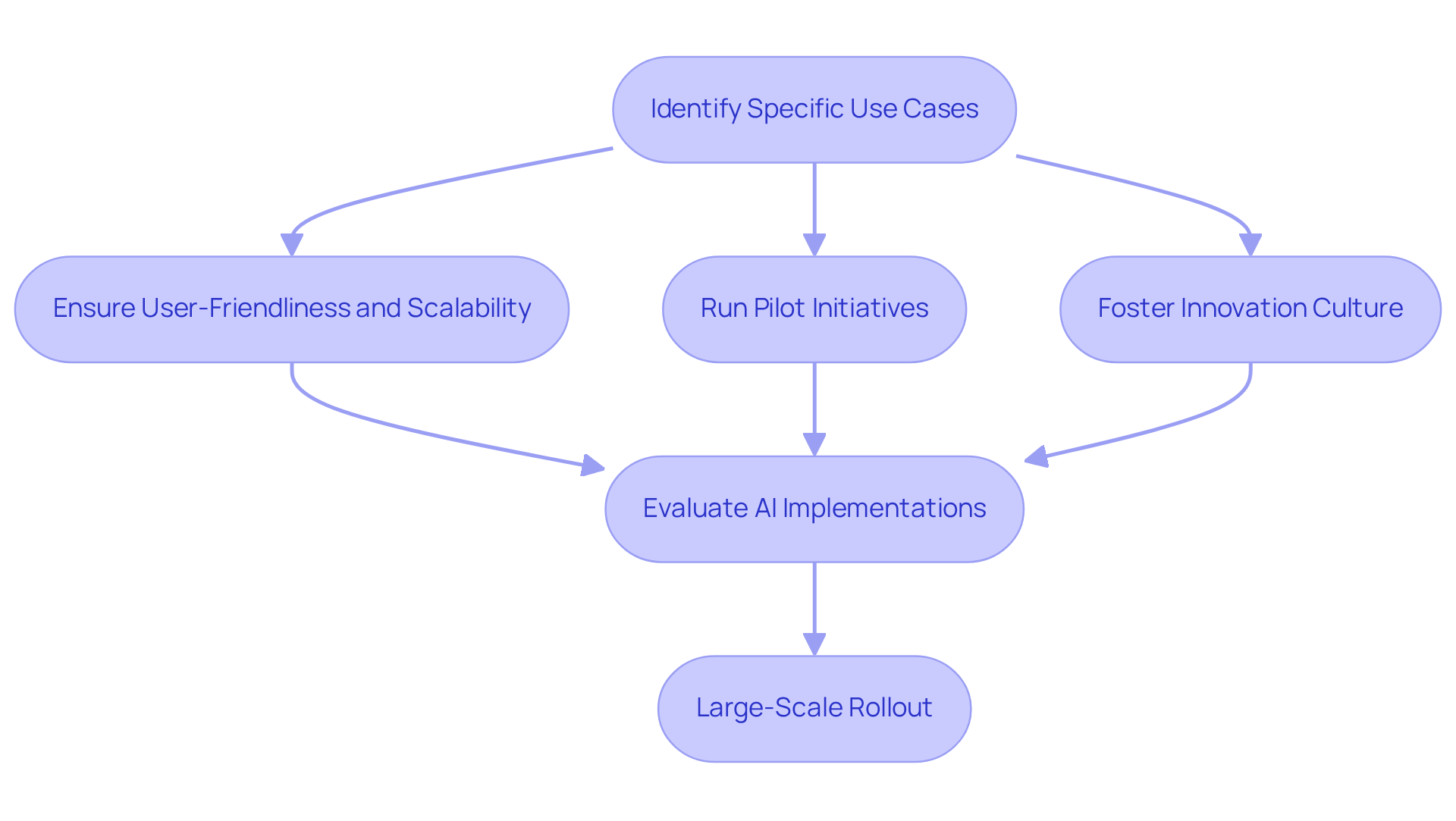
3 Key Practices for Implementing AI for Enterprise Success
GeneralOverview
To achieve enterprise success, organisations must prioritise three key practises in implementing AI:
- Understanding AI’s role in operations
- Developing effective integration strategies
- Measuring success through clear KPIs
These practises are not merely recommendations; they are essential for optimising efficiency, enhancing client interactions, and ensuring alignment with business objectives. By embracing these strategies, organisations can drive greater operational success and elevate customer satisfaction. The time to act is now—leverage AI to transform your enterprise and stay ahead in a competitive landscape.
Introduction
As artificial intelligence continues to reshape the landscape of enterprise operations, its potential to streamline processes and enhance customer engagement is becoming increasingly evident. Companies are not only automating routine tasks but also leveraging AI to glean insights from vast datasets, driving strategic decision-making and fostering customer loyalty. However, the journey to successful AI integration is fraught with challenges.
How can organisations effectively align their AI initiatives with their overarching business objectives to ensure maximum impact? This article explores three key practises that can guide enterprises in harnessing AI’s transformative power for sustained success.
Understand the Role of AI in Enterprise Operations
AI for enterprise is revolutionising operations by automating routine tasks, enhancing decision-making, and elevating client interactions. Consider Agentics’ customised voice AI offerings, which empower businesses to manage client inquiries continuously. This innovation significantly reduces response times, allowing human agents to focus on more complex issues.
Furthermore, AI’s ability to analyse vast datasets provides valuable insights that inform strategic decisions, such as identifying sales trends and understanding client preferences. Organisations leveraging Agentics’ solutions exemplify how AI can personalise client experiences, thereby boosting engagement and fostering loyalty.
By 2025, approximately 78% of enterprises will be utilising AI for enterprise in various capacities, with a substantial portion focusing on client interactions. This widespread adoption underscores the imperative for organisations to align their strategies for AI for enterprise with operational objectives to optimise efficiency and effectiveness.
Industry leaders emphasise that AI is not just a tool; it is a transformative force that can redefine organisational communication and operations, paving the way for enhanced productivity and customer satisfaction.

Develop Effective Strategies for AI Integration
To integrate AI for enterprise effectively, companies must first identify specific use cases that align with their business objectives. Consider a sales team implementing AI tools to automate lead scoring; this allows them to concentrate on high-potential prospects. Furthermore, ensuring that AI for enterprise systems are user-friendly and scalable is crucial. By running pilot initiatives, organisations can evaluate AI implementations in a controlled environment before a large-scale rollout. Additionally, fostering a culture of innovation and continuous learning among employees facilitates smoother transitions and encourages the adoption of AI for enterprise technologies. Companies like Agentics exemplify this approach, customising AI solutions to meet unique client needs, thereby ensuring that integration is both strategic and effective.

Measure Success and Optimize AI Performance
To effectively measure the success of AI implementations, organisations must establish clear key performance indicators (KPIs) that align with their strategic objectives. Metrics such as client satisfaction scores (CSAT)—which assess how pleased users are with products and services—response times, and sales conversion rates are essential for gaining insights into AI performance. A study found that companies utilising AI-driven customer service solutions reported a significant increase in customer satisfaction scores post-implementation, highlighting the positive impact of AI on user experience.
Regularly reviewing these metrics enables businesses to pinpoint areas for improvement and optimise their AI systems. If a chatbot’s response time is determined to be subpar, entities can implement necessary modifications to enhance its efficiency. Furthermore, leveraging advanced analytics tools allows companies to visualise performance data, facilitating clearer communication of results to stakeholders. Metrics like the Customer Effort Score (CES) and Task Success Rate are becoming vital in evaluating user experience with AI systems.
In 2025, the emphasis on KPIs for AI performance will continue to evolve, with organisations increasingly adopting metrics that capture both operational efficiency and client engagement. Notably, 62% of the value generated by AI is targeted at core business areas, emphasising the importance of aligning AI initiatives with business goals. By continuously monitoring and refining AI initiatives, companies can ensure they maximise the benefits of their technology investments, ultimately driving greater operational success and customer satisfaction. As Jerald Murphy, Senior Vice President of Research and Consulting, notes, KPIs are critical for evaluating success and demonstrating the overall value of AI projects. Additionally, 74% of organisations reported that their most advanced generative AI initiatives are meeting or exceeding ROI expectations, underscoring the effectiveness of AI implementations.
Conclusion
AI is fundamentally reshaping enterprise operations, presenting unprecedented opportunities for efficiency, decision-making, and customer engagement. By automating routine tasks and delivering deep insights into customer behaviour, organisations can enhance their operational strategies and align them with broader business objectives. The transformative potential of AI is evident in its capacity to redefine how companies interact with clients and manage internal processes.
This article highlights three essential practises for successful AI implementation:
- Understanding AI’s role in operations
- Developing effective integration strategies
- Measuring success through key performance indicators
Companies prioritising user-friendly AI systems and fostering a culture of innovation are better positioned to reap the benefits of these technologies. Moreover, establishing clear metrics for evaluating AI performance ensures that organisations can continuously optimise their systems and enhance customer satisfaction.
As businesses advance, embracing AI transcends mere technological upgrade; it is a strategic necessity. Organisations must act decisively to integrate AI effectively, measure its impact, and adapt their strategies to remain competitive. By doing so, they unlock the full potential of AI, driving operational success and delivering exceptional value to their clients. The future of enterprise operations lies in the hands of those willing to innovate and evolve, with AI at the forefront.
Frequently Asked Questions
How is AI transforming enterprise operations?
AI is revolutionising enterprise operations by automating routine tasks, enhancing decision-making, and improving client interactions.
What are some specific applications of AI in enterprises?
AI can be used to manage client inquiries continuously, significantly reducing response times and allowing human agents to focus on more complex issues.
How does AI contribute to decision-making in organisations?
AI analyses vast datasets to provide valuable insights that inform strategic decisions, such as identifying sales trends and understanding client preferences.
What role do companies like Agentics play in AI for enterprises?
Agentics offers customised voice AI solutions that empower businesses to enhance client interactions and personalise experiences, boosting engagement and fostering loyalty.
What is the projected adoption rate of AI in enterprises by 2025?
By 2025, approximately 78% of enterprises are expected to utilise AI in various capacities, particularly focusing on client interactions.
Why is it important for organisations to align their AI strategies with operational objectives?
Aligning AI strategies with operational objectives is crucial for optimising efficiency and effectiveness in enterprise operations.
How do industry leaders view the role of AI in organisations?
Industry leaders view AI as a transformative force that can redefine organisational communication and operations, leading to enhanced productivity and customer satisfaction.
Enjoyed this post? Share it with your network!
10 Best AI Sales Tools to Boost Your Team’s Performance

Discover the top 10 best AI sales tools to enhance team performance and drive revenue growth.
Mastering Test Call Numbers: A Step-by-Step Guide for Sales Directors

Elevate your communication with our guide on mastering test call numbers for sales success.
7 Ways Automated Outbound Calls Boost Sales Performance

Discover how automated outbound calls enhance sales performance and streamline communication.
